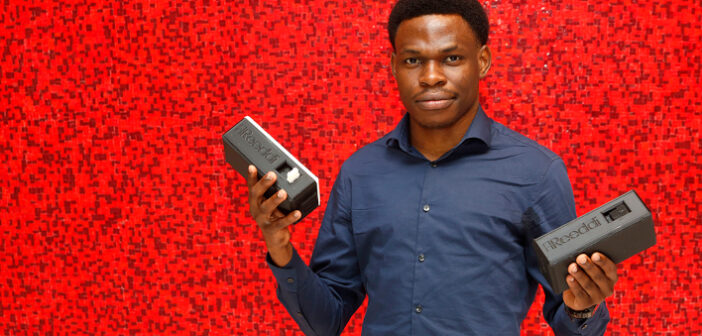Olugbenga Olubanjo, an entrepreneur, is providing an alternative to conventional electricity generating. The “Reeddi Capsules” his business Reeddi rents out may power appliances like TVs, laptops, and refrigerators. They are tiny, lightweight solar-powered batteries.
Despite having considerable energy reserves, the International Energy Agency estimates that over 92 million Nigerians lack access to power. For those who are plugged into the electrical system, frequent power outages cost the nation $28 billion annually, or about 2% of its GDP.
Olubanjo, a master’s student in civil engineering at the University of Toronto, and his team at Reeddi (pronounced “ready”) want to liberate Nigerians from an expensive and unreliable electricity system by providing them with clean, affordable, and portable power.
Two more U of T students work for Reeddi: Joshua Dzakah, a mechanical engineering undergraduate, and Osarieme Osakue, a master’s candidate in civil engineering and the company’s director of communications.
For the third time this year, Reedi Inc. placed second in the Cisco Global Problem Solver Challenge. Additionally, a temporary patent was obtained.
The seeds of Reeddi were germinated in 2017 while Olubanjo was studying in Toronto.. He frequently had abrupt disconnections while speaking to friends or family back home. He learned that the regular power outages in Nigeria were the cause of the hiccups and the source of his annoyance.
Olubanjo remembered being “at Massey College at night with light everywhere” and found it difficult to envision coming back to his home since it was like “going back to darkness.” In his home Nigeria, there was occasionally only two hours of electricity each day available. Olubanjo set out to discover a solution to an issue that many people back home encountered every day.
Reeddi Capsules can be purchased for 199,000 Nigerian Naira (about $430) along with a solar panel or rented from “mom-and-pop shops” for 24 hours for about 50 cents, charged by Reeddi solar panels. According to Olubanjo, a single battery can run a 15-watt fan for 15 hours or a TV for about five hours.
Customers would pay rent for a 250 watt-hour (Wh) capsule at a rate of up to 50 cents (US) each 24 hours. A typical 250Wh capsule can fully charge three smartphones, power a laptop for four hours, and provide lights for two 150 lumen LED bulbs for a total of seven hours of illumination. Additionally, capsules may be linked together and expanded in a modular manner. If they were multiplied by two, they would produce a 500Wh unit, and so on, for larger power requirements like operating appliances.
If the capsule is depleted, it can be returned sooner than the rental duration. Customers receive points to apply towards future exchanges as a reward for returning the capsule on time.
That makes it significantly more expensive than taking energy from the grid, although it’s frequently less expensive than using a generator.
The potential impact is what really motivates and excites Olubanjo. With scalable possibilities, the clean and inexpensive power source would give households more reliable electricity.
A trader in Ogun State named Joel Jewell claims that he uses the capsule on a daily basis to charge both his phone and laptop. He is compelled to use his generator amid the frequent power outages without it. “We sometimes don’t (even) get two hours of power supply,” he claimed. And Reeddi’s arrival is kind of a response to prayer.
The batteries are now only accessible in Nigeria, where Olubanjo claims that around 1,600 people, mostly in Lagos and Ogun State, utilise them. However, the International Energy Agency estimates that more than 600 million people on the continent do not have access to energy.
Olubanjo claims that organisations in nations including South Africa, Ghana, and Uganda have shown interest in the Reeddi Capsule. Before we scale it to that larger part of Africa, we’re going to do our best to optimise what we have in Nigeria, he said.




